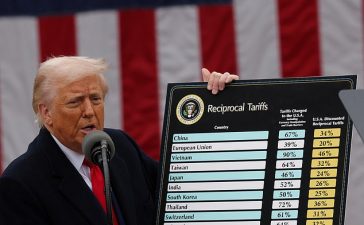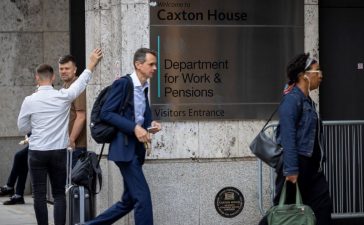For months, rumours around the financial health of Austrian property giant Signa had been swirling. So its founder René Benko did one of the things he did best: he threw a party.
Champagne flowed under the Christmas lights at the ultra-luxurious hotel Interalpen in Telfs, high above Innsbruck, the capital of Tyrol in western Austria where Signa is based, and the billionaire’s birthplace.
Boney M, the disco sensation known for 1970s hits such as Daddy Cool and Rasputin, regaled employees. And a defiant Benko gave a speech.
People present said the entrepreneur sought to project an image of strength that promised an even more lucrative future than the past had delivered for his sprawling property empire.
But in the end the rumours caught up with Benko — a charismatic businessman who made his first billion before the age of 40.
On Wednesday, nearly a year after that party, Signa, one of Europe’s highest profile luxury property developers with assets worth as much as $27bn, announced it was urgently restructuring. In the process, Benko was forced out of the boardroom by his minority co-investors.
Signa is not a household name, but many of its assets are: the Chrysler building in New York, London department store Selfridges, its Berlin equivalent KaDeWe, and countless other high-value developments in some of the most expensive metropolitan real estate in the world.

Quite what the scale of Signa’s debts are remains unclear. They run into the billions, according to two people familiar with the company’s balance sheet.
According to one Signa document seen by the Financial Times, Signa Holding — the central hub of the corporate network — was due to pay back €1.3bn in borrowing this year alone.
The company’s ownership structure is complex: Many Signa debts, including hundreds of millions lent by European banks, on a scale that has concerned the ECB, are collateralised directly against individual properties, according to two Signa lenders. Others are not.
Benko’s foundation is still the majority owner through a network of trusts and holding companies in Austria, Liechtenstein and offshore, according to Signa. But it has become clear in recent months, as the need to raise fresh capital became ever more desperate, that some of his co-investors have grown unhappy with the way he was running the business.
That Signa’s investors include some of the wealthiest families in Europe is a testament to Benko’s skills as a salesman and networker — and to the years in which the group was an irresistible moneymaking machine.
The shareholder book reads like a Who’s Who of European capitalism: among them are France’s Peugeot family; Tetra Pak’s Rausings; logistics magnate Klaus Michael-Kühne; Roland Berger, founder of the eponymous international management consultancy; Swiss chocolate group Lindt & Sprüngli’s chair Ernst Tanner; Austrian industrialist Hans Peter Haselsteiner; and pet food tycoon Torsten Toeller. Even the heirs of Austrian formula 1 racing legend Niki Lauda own shares.
The man brought in to mediate between their needs, and to hold, for now, Benko’s voting rights, while trying to shore up Signa’s finances, is the German restructuring expert Arndt Geiwitz. His last big project was helping to restructure and save Lufthansa in 2020.

“The aim is to find long-term solutions, and that’s why it is both responsible and necessary to initiate a comprehensive consolidation for the company now,” Geiwitz said in a statement on Wednesday. On Friday, Geiwitz, 54, announced the appointment of Ralf Schmitz as “chief restructuring officer” for the group.
“The aim is to draw up a plan for the main steps of the restructuring by the end of November and present it to the shareholders,” Geiwitz said. “All areas of the Signa Group must be put to the test.”
Signa declined to comment for this article. Benko could not be reached for comment.
Geiwitz said he believed the quality of Signa’s underlying assets was sound. But he might not avoid financial pain: the executive must either raise fresh capital or sell assets in a commercial real estate market strained by higher interest rates and undiminishing office vacancies.
Then there is the problem of large unfinished projects such as the Elbtower in Hamburg — inaugurated by Germany’s current chancellor Olaf Scholz while still mayor of the city — and the Lamarr luxury department store development in Vienna, both of which were launched before the property downturn.
Geiwitz’s more immediate issue however could be a €200mn private bond issued by Signa is due for repayment at the end of this month.
Financial regulators are racing to determine the extent of the possible financial damage and who would be hurt. The ECB last year started asking European banks to report their exposures to Signa, and has since stepped up its surveillance, according to the Frankfurt institution’s officials. In August, the ECB told lenders to begin setting aside provisions for possible losses.
Austrian banks are particularly exposed, chiefly Raiffeisen, the country’s largest lender, according to financial regulators.
The Vienna-based lender has sought to reassure its business partners and shareholders over its exposure to the property group. Much of its lending is secured against properties it says overcollateralise its exposure.
A spokesperson for RBI said it could not comment on client matters.
The Thai Central Group, which co-owns some of the most valuable properties in the Signa stable, such as the Chrysler building in New York and British department store Selfridges, may emerge as a possible buyer.
A cash-hungry Signa may find itself willing to accept a lowball offer to bail it out, one person close to Signa said.
In his native Austria, meanwhile, Benko’s troubles are being picked over with glee by some.
The 46-year-old has long been a fixture of the society scene in Vienna, cultivating celebrities and politicians. Officials close to the former chancellor Sebastian Kurz jokingly called Benko “Mr 64 metres”, in reference to the yacht in the Adriatic they sometimes found themselves invited aboard.
One high profile annual event was his Törggelen — a traditional November-time festival celebration from Tyrol that Benko imported to Vienna and turned into a sumptuous society fixture.
But Benko’s prominence also made him a target. While no charges have been brought, he is being investigated as part of a sprawling Austrian probe into government corruption. Signa’s Innsbruck headquarters were raided by Austrian police last October.
Public anger has also mounted over Benko’s business tactics. Two major European retail chains he bought, Germany’s Galeria Karstadt Kaufhof and Austria’s Kika/Leiner were placed into bankruptcy in the past year.
In 2018, Benko bought a quarter of Austria’s biggest newspaper, the tabloid Kronen Zeitung — and made it clear he wanted more control. That put him into conflict with the majority owner — the Dichand family, of whom Christoph Dichand is also the paper’s editor.
It was the Krone, as it is known, that was the first to reveal Benko was gone from the empire he built. “This is the death knell,” it declared.









